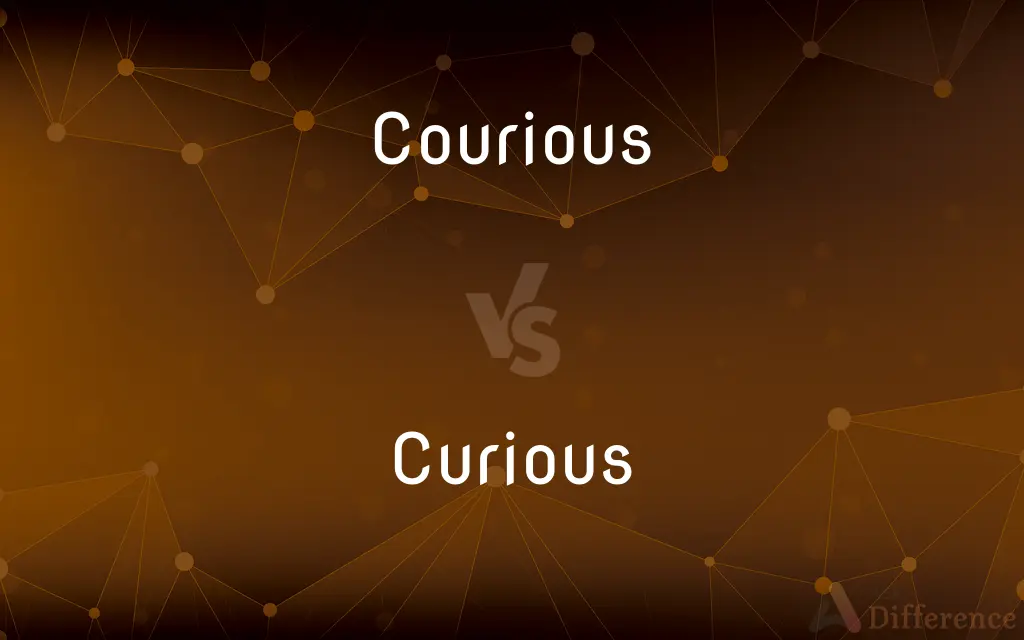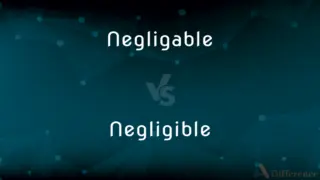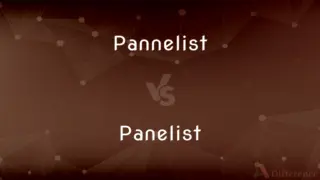Courious vs. Curious — Which is Correct Spelling?
By Tayyaba Rehman — Updated on March 29, 2024
"Courious" is an incorrect spelling. The correct spelling is "Curious," denoting an eagerness to know or learn.

Table of Contents
Which is correct: Courious or Curious
How to spell Curious?

Courious
Incorrect Spelling

Curious
Correct Spelling
ADVERTISEMENT
Key Differences
Think of a cat being "cur-ious," playing on the phrase "curiosity killed the cat."
Say it out loud: "KYUR-ee-us" to grasp the sound.
Remember that the word contains no "o" after the "u."
"Cour" often starts words related to court, like "courtroom" or "courteous."
Remember the "cur" as in "current."
ADVERTISEMENT
How Do You Spell Curious Correctly?
Incorrect: The cat's courious nature led it to explore the entire house.
Correct: The cat's curious nature led it to explore the entire house.
Incorrect: It's courious how these ancient artifacts were preserved for so long.
Correct: It's curious how these ancient artifacts were preserved for so long.
Incorrect: Children are naturally courious and ask many questions.
Correct: Children are naturally curious and ask many questions.
Incorrect: He had a courious look on his face when he saw the painting.
Correct: He had a curious look on his face when he saw the painting.
Incorrect: She was very courious about the new student.
Correct: She was very curious about the new student.
Curious Definitions
Carefully made or designed.
The artifact was a curious piece of ancient history.
Eager to learn or know.
She was always curious about new cultures.
Showing an interest in learning.
A curious child often asks many questions.
Inquisitive about others' affairs.
Neighbors became curious about the noises next door.
Eager to learn more
Curious investigators.
A trapdoor that made me curious.
Unduly inquisitive; prying
A curious neighbor always looking over the fence.
Arousing interest because of novelty or strangeness
A curious fact.
Accomplished with skill or ingenuity.
Extremely careful; scrupulous or fastidious.
Tending to ask questions, or to want to explore or investigate; inquisitive; (with a negative connotation) nosy, prying.
Young children are naturally curious about the world and everything in it.
Caused by curiosity.
Leading one to ask questions about; somewhat odd, out of the ordinary, or unusual.
The platypus is a curious creature, with fur like a mammal and a beak like a bird.
(LGBT) bi-curious
(obsolete) Careful, fastidious, particular; (specifically) demanding a high standard of excellence, difficult to satisfy.
(obsolete) Carefully or artfully constructed; made with great elegance or skill.
Containing or pertaining to trivalent curium. Category:en:Radioactivity
Difficult to please or satisfy; solicitous to be correct; careful; scrupulous; nice; exact.
Little curious in her clothes.
How shall we,If he be curious, work upon his faith?
Exhibiting care or nicety; artfully constructed; elaborate; wrought with elegance or skill.
To devise curious works.
His body couched in a curious bed.
Careful or anxious to learn; eager for knowledge; given to research or inquiry; habitually inquisitive; prying; - sometimes with after or of.
It is a pity a gentleman so very curious after things that were elegant and beautiful should not have been as curious as to their origin, their uses, and their natural history.
Exciting attention or inquiry; awakening surprise; inviting and rewarding inquisitiveness; not simple or plain; strange; rare.
A multitude of curious analogies.
Many a quaint and curious volume of forgotten lore.
Abstruse investigations in recondite branches of learning or sciense often bring to light curious results.
Many . . . which used curious arts brought their books together, and burned them.
Beyond or deviating from the usual or expected;
A curious hybrid accent
Her speech has a funny twang
They have some funny ideas about war
Had an odd name
The peculiar aromatic odor of cloves
Something definitely queer about this town
What a rum fellow
Singular behavior
Eager to investigate and learn or learn more (sometimes about others' concerns);
A curious child is a teacher's delight
A trap door that made me curious
Curious investigators
Traffic was slowed by curious rubberneckers
Curious about the neighbor's doings
Having curiosity aroused; eagerly interested in learning more;
A trap door that made me curious
Peculiar or unusual.
He had a curious way of tilting his head when listening.
Curious Meaning in a Sentence
It's curious how these ancient artifacts were preserved for so long.
Children are naturally curious and ask many questions.
He had a curious look on his face when he saw the painting.
Curious minds often find the most innovative solutions.
She was very curious about the new student.
I'm curious to know what you think about this issue.
Her curious behavior made everyone else in the room take notice.
He read the book with a curious interest in ancient history.
The cat's curious nature led it to explore the entire house.
Being curious about the world can lead to amazing discoveries.
Curious students tend to perform better academically.
The curious incident happened late at night.
The scientist was curious about the results of the experiment.
The curious case puzzled the detectives for weeks.
Curious about other cultures, she traveled the world.
A curious crowd gathered around the street performers.
A lifelong learner is always curious about new ideas.
He was curious to see how the machine worked.
The teacher encouraged her students to remain curious.
Curious artifacts were found during the excavation.
Common Curiosities
Which vowel is used before Curious?
Typically, "a" as in "a curious child."
Why is it called Curious?
Derived from Latin "curiosus" meaning careful or inquisitive.
Which conjunction is used with Curious?
Standard conjunctions like "and" or "or" can be applied.
What is the verb form of Curious?
There isn't a direct verb form. However, "curiosity" can drive someone to "inquire" or "investigate."
What is the pronunciation of Curious?
It's pronounced as "KYUR-ee-us."
What is the root word of Curious?
The root is the Latin word "curiosus."
What is the plural form of Curious?
Adjectives don’t have a plural form, so it remains "curious."
Is Curious a noun or adjective?
Adjective.
Is Curious an adverb?
No.
Which article is used with Curious?
Both "a" and "the" can be used, depending on the context.
Is the word Curious imperative?
No.
What part of speech is Curious?
Adjective.
What is the singular form of Curious?
Curious itself is singular.
Which preposition is used with Curious?
Typically "about" as in "curious about something."
Is the Curious term a metaphor?
No, but it can be used in metaphorical expressions.
What is another term for Curious?
Inquisitive.
Which determiner is used with Curious?
Determiners like "this" or "that" can be used.
Is Curious a collective noun?
No.
How many syllables are in Curious?
Three syllables.
How do we divide Curious into syllables?
Cu-ri-ous.
What is a stressed syllable in Curious?
The first syllable, "cu," is stressed.
What is the first form of Curious?
Curious is an adjective and doesn't have verb forms.
What is the second form of Curious?
N/A.
Is Curious an abstract noun?
No, it's an adjective. However, "curiosity" is a related abstract noun.
Is Curious a vowel or consonant?
It's a word containing both vowels and consonants.
Is Curious a countable noun?
It's not a noun, so it's not countable.
What is the opposite of Curious?
Indifferent or uninterested.
Is Curious a negative or positive word?
Neutral. However, context can influence its connotation.
What is the third form of Curious?
N/A.
How is Curious used in a sentence?
I'm curious to know more about your experiences abroad.
Share Your Discovery

Previous Comparison
Negligable vs. Negligible
Next Comparison
Pannelist vs. PanelistAuthor Spotlight
Written by
Tayyaba RehmanTayyaba Rehman is a distinguished writer, currently serving as a primary contributor to askdifference.com. As a researcher in semantics and etymology, Tayyaba's passion for the complexity of languages and their distinctions has found a perfect home on the platform. Tayyaba delves into the intricacies of language, distinguishing between commonly confused words and phrases, thereby providing clarity for readers worldwide.


































